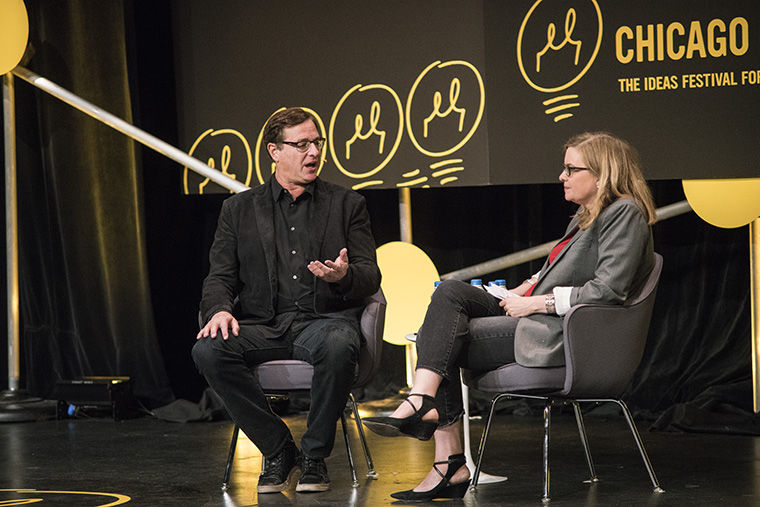Professor, stars share ‘ideas’ on comedy’s power
Anne Libera, director of Columbia and Second City’s comedy studies program hosted the “Comedy: But Seriously…” Oct. 19 talk that featured comedian Bob Saget.
October 24, 2016
Although most comedians like to pretend comedy and jokes happen magically, they are far more calculated than what people see on the stage, said Anne Libera, assistant professor in the Theatre Department and director of Columbia and Second City’s comedy studies program.
“One of the questions I get most frequently is ‘How can you teach comedy? Aren’t people just naturally funny?’” Libera said. “As much as all these comedians like to pretend it’s magic, it’s not. It’s really more like math.”
Libera hosted the Chicago Ideas Week Oct. 19 discussion “Comedy: But Seriously…” The discussion included prominent comedy creators such as Bob Saget, best known for his role as Danny Tanner in the hit TV series “Full House;” Negin Farsad, comedian and author best known for her book “How to Make White People Laugh”; Chelsea Devantez, writer for Jon Stewart’s new HBO project and former Second City performer; and Phoebe Robinson, comedian and author of the book “You Can’t Touch My Hair.”
Saget entertained the audience with jokes about how he’s not a “carrier” when he greeted Libera with a handshake and his thrill being at the event instead of watching “the f–king [presidential] debate” that was simultaneously occurring. As for being a comedian, he said it is about more than fame.
“Being a celebrity isn’t anything,” Saget said. “Doing good work [and] being great at whatever you’re passionate about [is].”
Before the Q&A, the packed auditorium filled with chatter as strangers turned to each other and introduced themselves, an example of what these events can accomplish, said Chicago Ideas Week Director of Marketing & Media Sona Jones. Chicago Ideas Week is a festival with more than 150 events Oct. 17–23.
During the event, Libera explained that the best comedy moments occur when the elements of recognition, pain and distance join to produce laughter.
“You get to this great moment where all of the elements come together, and a group of people sitting in a half dark [room] have the same thought at the same time, and they do this amazing thing: they laugh,” Libera said.
During the Q&A session, Devantez said no topic is off-limits when it comes to jokes. Robinson agreed , adding that you can make fun of anything as long as you do it the in the right context.
Farsad said one way of using stereotypes in comedy is to show how ridiculous they are. For example, when Trump referred to vetting Muslims in the U.S., Farsad walked through New York city asking people to eat bacon to prove they were not Muslim.
“I would ask them ‘Are you Muslim?,’ and I would say ‘Prove it!’” Farsad said as the audience laughed. “If they didn’t eat the bacon, I [would sarcastically say] ‘You’re Muslim!’”
Libera, who asked the audience if comedy can be used as a social change agent, said for her the answer is uncertain. However, there is one thing comedy can show people, she said.
“Can comedy create change? I honestly don’t know,” Libera said. “But comedy [can] tell us that we’re [all] changing.”








